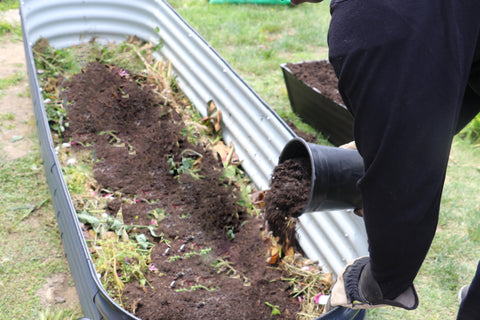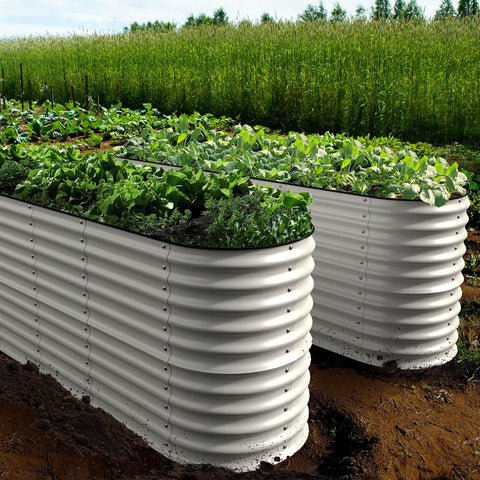Knowledge from Olle Garden Bed: Can You Plant It Directly Into The Rotting Feces
The decomposed feces can create miracles for your plants. But you can't directly plant it in the rotting feces, because it is too rich to retain enough water, and it is too unstable to form healthy roots. Feces provide some nutrients, but they cannot replace soil, which also contains inorganic compounds, air and water needed by plants. If this post spurred your interest and you want to find out more about garden beds, please feel free to contact us.

Can it be directly planted into composted horse dung?
You can't directly plant it in the composted horse dung, because your plants will not be strong and healthy, and will be more likely to die. It is best to mix it with the soil, as feces do not retain moisture as soil does.
Horse dung is an excellent compost material, but it takes at least six months to use. Horse dung contains nitrogen, phosphorus and potassium. All gardeners will immediately recognize these chemicals as NPK formulas, which are printed on many fertilizer bags seen in the nursery.
You can also spread it on the surface of the planted garden bed, and the microorganisms and insects living in the soil will ensure that it is absorbed.
Can it be directly planted into composted cow dung?
You cannot plant it directly into compost cow dung alone, because it is not stable enough to form solid roots and will soon dry. If your cow dung is spread on the soil, you should plant it on the soil itself, not just on the top of the fertilizer.
Fresh cow dung contains high levels of ammonia and salt, which can burn plants, so it must be fully decomposed. Feces should not come in direct contact with plants.
Cow dung is one of the best ways to provide a large amount of organic matter for the garden, because it helps regulate the soil and provides nutrients and trace elements. However, it is better to mix the excrement into the topsoil instead of planting it directly on the surface, because it will burn plants.
Can it be directly planted into composted chicken manure?
You can't plant it directly in compost chicken manure because it has a high nitrogen content and will burn the roots of plants. It is better to choose a safer route and mix it well into the soil before planting. Feces are essentially food. Plants like to live in the soil, not their food.
Its NPK content is higher than horse dung and cow dung, so it must be composted well before use. Its high nitrogen content may be too much for rhizome vegetables, especially those with deformed rhizomes, so you should only add a small amount.
In other words, mature chicken manure is very beneficial to plants, and its high NPK level is very suitable for fruits and vegetables.
Can you grow it in rotten dung?
You cannot sow in the rotten dung, because even if they germinate, they will soon die. High nitrogen levels will burn their tender roots and buds
In addition, feces are unlikely to retain enough moisture to allow seeds to germinate. The excrement is too light to support strong root growth, and will shrink quickly in the flowerpot or flowerpot because it is too easy to compact.
Excessive feces will kill plants, because other elements contained in the soil do not fully dilute the NPK concentration.
Can I use excrement instead of potted soil?
You cannot use excrement instead of potted soil, because plants will not get a stable and balanced substrate to form strong roots. The excrement, no matter how well it rots, cannot replace the soil. Potting soil does not contain nutrients that do not exist in feces, so it cannot provide a balanced plant diet.
In addition, compost manure is lighter than soil, and will eventually settle lower in the planter, resulting in the loss of substrate around the plant base and roots.
Fecal is a very loose inflatable material, which can not keep moisture well. Most plants need a little time to contact water to absorb it properly, so if the water is lost too quickly, they will eventually dehydrate.

Do plants grow faster in feces?
When fertilizer is mixed with soil, plants grow faster in the manure. Faeces provide nutrients for plants, which may be lacking in the soil itself. It can also improve the drainage or water retention according to the soil type to ensure that the plants get enough water supply, but at the same time, it will not rot root rot.
Because feces improve the nutrition level, it can make plants grow faster. However, the well rotted excrement itself is too rich, and the high level in the soil will lead to rapid but weak growth, making plants grow longer legs. The indoor gardener knows that you can kill plants by overfeeding them.
If mixed into the soil, the decomposed feces can stimulate growth and provide nutrients that may be lacking, but you should always add more feces wisely. Adding compost to the soil can improve the drainage of heavy clay and help to retain water in sandy soil.
When fertilizer is mixed with soil, plants grow faster in the manure. Faeces provide nutrients for plants, which may be lacking in the soil itself. It can also improve the drainage or water retention according to the soil type to ensure that the plants get enough water supply, but at the same time, it will not rot root rot.
When will decomposed dung become soil?
Strictly speaking, decomposed dung will not become soil. The soil contains minerals, trace elements and inorganic substances that are not found in feces. If placed for a long time, it can be similar to soil in texture, but it is still not soil.
Soil consists of inorganic compounds and a specific proportion of water and air that are not present in compost.
Forty five percent of typical soils are composed of minerals, 20 to 30 percent are water, and 20 to 30 percent are air. In most soils, only five percent are made of organic matter. In contrast, well decayed feces are almost entirely composed of organic plant materials.
The rotten excrement will eventually be absorbed by the soil and form a part of the soil, but it cannot become the soil itself.

How long does the fertilizer need to be placed before planting?
The composting process of cow dung may take up to six months, depending on climate, temperature and humidity levels. If you take good care of it, it may take about four to six weeks, but if not, it should be kept for six months. Chicken droppings should be kept for six to twelve months.
If you are ready to invest some time and energy, often rotate the feces to inflate it, add a little water from time to time, and add some dry carbon in the form of straw, dry leaves or broken bark, you can speed up the decomposition process. The size of the manure pile also affects the time required for decay, because smaller manure piles decompose faster than large ones.
Decay occurs faster at warm temperatures than at cold temperatures.
